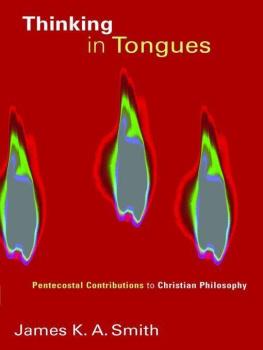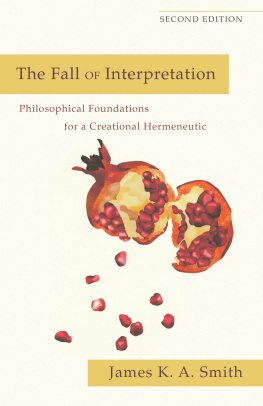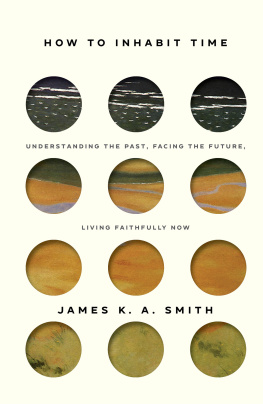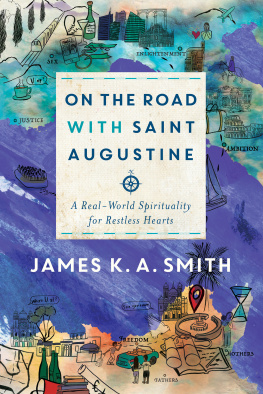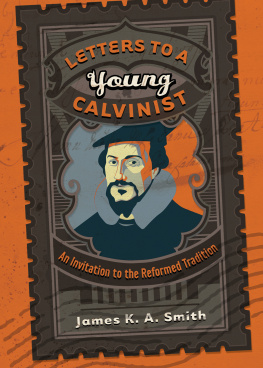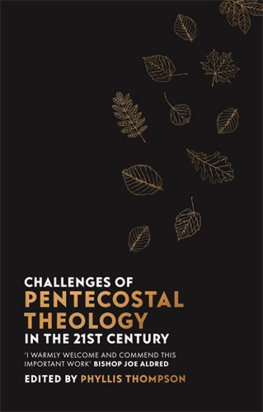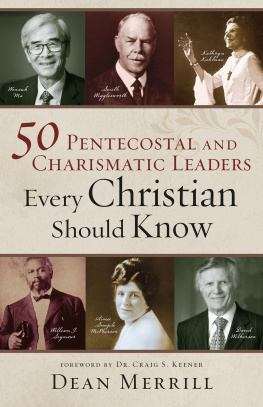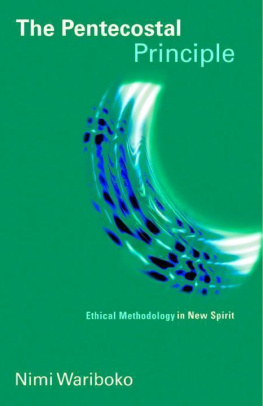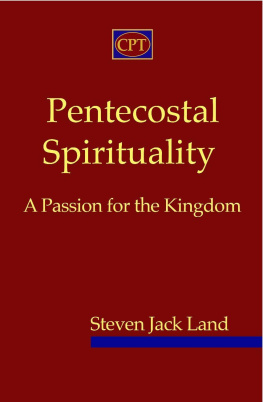Table of Contents
Pentecostal Manifestos
James K. A. Smith and Amos Yong, Editors
PENTECOSTAL MANIFESTOS will provide a forum for exhibiting the next generation of Pentecostal scholarship. Having exploded across the globe in the twentieth century, Pentecostalism now enters its second century. For the past fifty years, Pentecostal and charismatic theologians (and scholars in other disciplines) have been working internally, as it were, to articulate a distinctly Pentecostal theology and vision. The next generation of Pentecostal scholarship is poised to move beyond a merely internal conversation to an outwardlooking agenda, in a twofold sense: first, Pentecostal scholars are increasingly gaining the attention of those outside Pentecostal/charismatic circles as Pentecostal voices in mainstream discussions; second, Pentecostal scholars are moving beyond simply reflecting on their own tradition and instead are engaging in theological and cultural analysis of a variety of issues from a Pentecostal perspective. In short, Pentecostal scholars are poised with a new boldness:
Whereas the first generation of Pentecostal scholars was careful to learn the methods of the academy and then apply those to the Pentecostal tradition, the next generation is beginning to interrogate the reigning methodologies and paradigms of inquiry from the perspective of a unique Pentecostal worldview.
Whereas the first generation of Pentecostal scholars was faithful in applying the tools of their respective trades to the work of illuminating the phenomena of modern Pentecostalism, the charismatic movements, and (now) the global renewal movements, the second generation is expanding its focus to bring a Pentecostal perspective to bear on important questions and issues that are concerns not only for Pentecostals and charismatics but also for the whole church.
Whereas the first generation of Pentecostal/charismatic scholars was engaged in transforming the anti-intellectualism of the tradition, the second generation is engaged in contributing to and even impacting the conversations of the wider theological academy.
PENTECOSTAL MANIFESTOS will bring together both high-profile scholars and newly emerging scholars to address issues at the intersection of Pentecostalism, the global church, the theological academy, and even broader cultural concerns. Authors in PENTECOSTAL MANIFESTOS will be writing to and addressing not only their own movements but also those outside of Pentecostal/ charismatic circles, offering a manifesto for a uniquely Pentecostal perspective on various themes. These will be manifestos in the sense that they will be bold statements of a distinctly Pentecostal interjection into contemporary discussions and debates, undergirded by rigorous scholarship.
Under this general rubric of bold, programmatic manifestos, the series will include both shorter, crisply argued volumes that articulate a bold vision within a field as well as longer scholarly monographs, more fully developed and meticulously documented, with the same goal of engaging wider conversations. Such PENTECOSTAL MANIFESTOS are offered as intrepid contributions with the hope of serving the global church and advancing wider conversations.
PUBLISHED
Frank D. Macchia, Justified in the Spirit: Creation, Redemption, and the Triune God (2010)
James K. A. Smith, Thinking in Tongues: Pentecostal Contributions to Christian Philosophy (2010)
Wolfgang Vondey, Beyond Pentecostalism: The Crisis of Global Christianity and the Renewal of the Theological Agenda (2010)
2010 James K. A. Smith
All rights reserved
Published 2010 by
Wm. B. Eerdmans Publishing Co.
2140 Oak Industrial Drive N.E., Grand Rapids, Michigan 49505 /
P.O. Box 163, Cambridge CB3 9PU U.K.
Printed in the United States of America
16 15 14 13 12 11 10 7 6 5 4 3 2 1
Library of Congress Cataloging-in-Publication Data
Smith, James K. A., 1970-
Thinking in tongues: pentecostal contributions to Christian philosophy /
James K. A. Smith.
p. cm. (Pentecostal manifestos)
Includes bibliographical references and index.
ISBN 978-0-8028-6184-9 (pbk.: alk. paper)
1. Pentecostalism. 2. Philosophical theology. I. Title.
BR1644.S545 2010
230.994 dc22
2010005260
www.eerdmans.com
For Rev. Charles Swartwood,
Patrick & Dorothy St. Pierre,
and the saints at Bethel Pentecostal Tabernacle, Stratford, Ontario
for welcoming us to Pentecost;
for Rev. Ron Billings,
David & Stephanie Burton,
and our brothers & sisters at Cornerstone Christian Fellowship,
Abington, PA
for encouraging us to keep the Feast;
and
for Amos Yong,
fellow pilgrim, wise guide, and faithful friend all along the way.
Acknowledgments
When I once tried to explain this book to a friend who was not a Christian, I realized it sounded like the plot of a David Lodge farce. Indeed, the very idea of a pentecostal philosopher has the quirky, whimsical makings of a Wes Anderson film or a Dave Eggers story (you know the sort of plot: When a one-armed Jewish fashion designer is put in charge of a hog production plant in Pender, Nebraska ...). Its easy enough to imagine a wizened Bill Murray or naive Jason Schwartzman in the lead role.
But I have been sustained by a circle of friends and colleagues who have provided the plausibility structures needed for this project to make sense and (hopefully!) resist spiraling into a vaudeville production. More importantly, they have provided support, encouragement, and opportunities for this book to become a reality. I think all the way back, for instance, to my correspondence with Ron Kydd, the first pentecostal scholar Id ever come in contact with. His letter meant more than he could know. When I was just beginning to imagine myself as a pentecostal philosopher, I was inspired by the crew I thought of as the Cleveland gang: Chris Thomas, Steve Land, and Rickie Moore, the first editors of the Journal of Pentecostal Theology. Only later was I nourished firsthand by conversations at the Society for Pentecostal Studies where, somehow, Don Dayton, Dale Irvin, Ralph Del Colle, and Frank Macchia always ended up back in the hotel room I shared with Amos Yong. Those late-night conversations have been treasured opportunities for me.
I first started to imagine this book when Blaine Charette invited me to give the Pentecostal Lectures at Northwest University in 2006. His kindness and hospitality were matched by Jack Wisemore and others at Northwest, for which Im grateful. My colleague at Calvin College, Del Ratzsch, very kindly passed on to me his personal library of books, tracts, and newspapers on Pentecostalism that now constitutes the Del Ratzsch Pentecostal Library in my office. Im grateful for his gift, but even more so for his encouragement. Dean Zimmerman provided critical, constructive feedback on an early draft of the book (and shouldnt be blamed for the problems that remain). Ryan Weberling provided help getting the manuscript into some semblance of a book and assisted with the index.
A grant from the John Templeton Foundation funded research on chapter 5 and, coupled with a summer research fellowship from Calvin College, enabled me to finish the manuscript. Im grateful to Jon Pott and all the good folks at Eerdmans for their patience, and for taking a risk on this little pentecostal manifesto.

